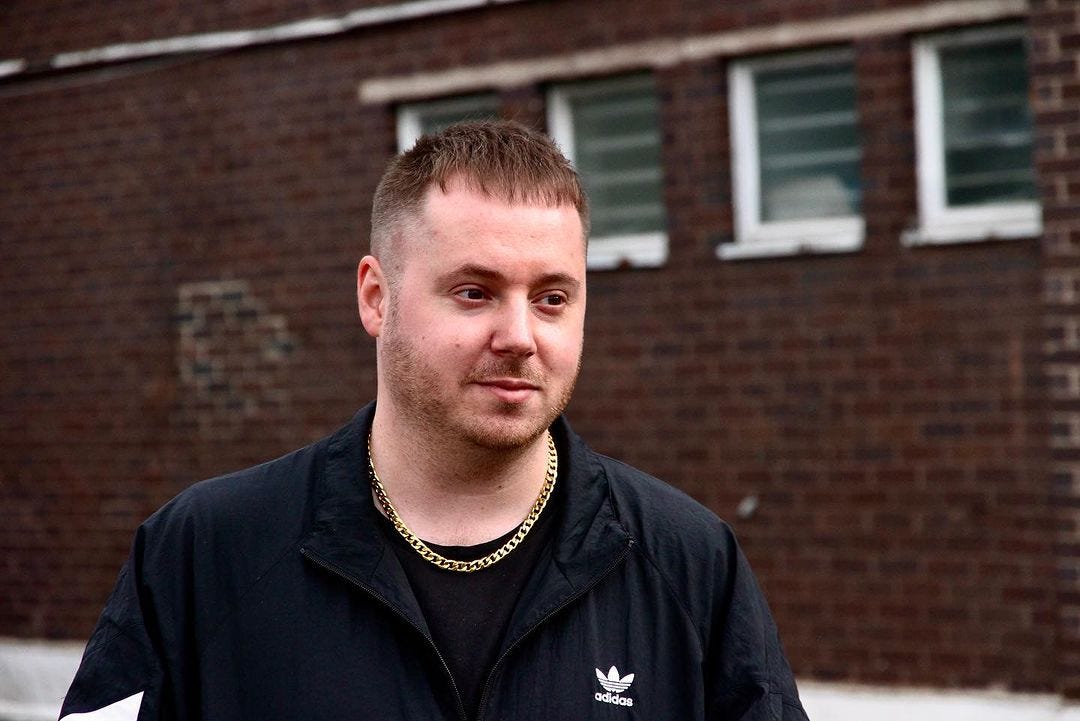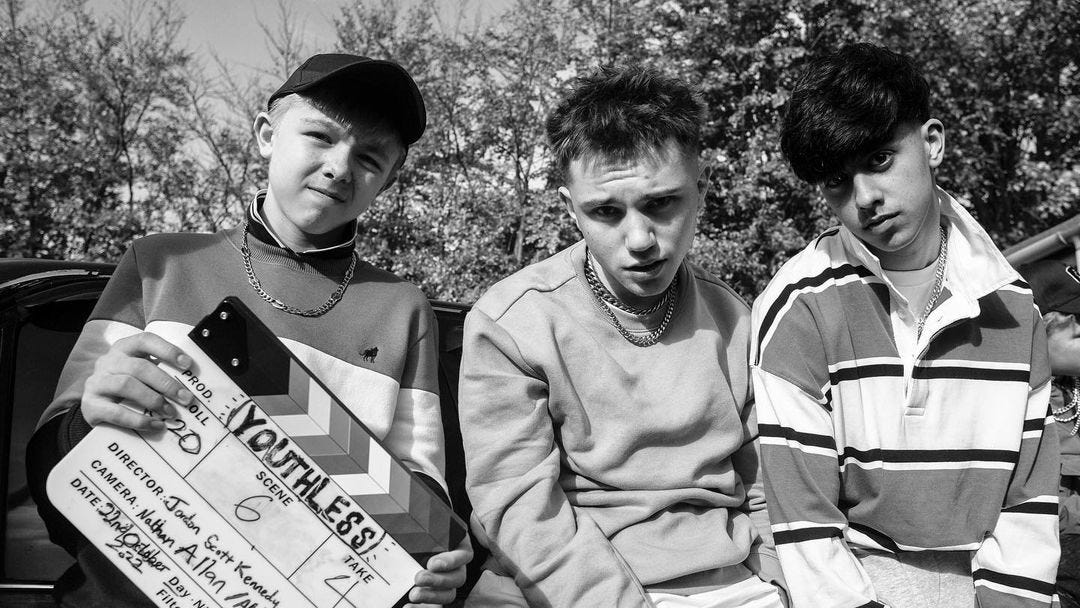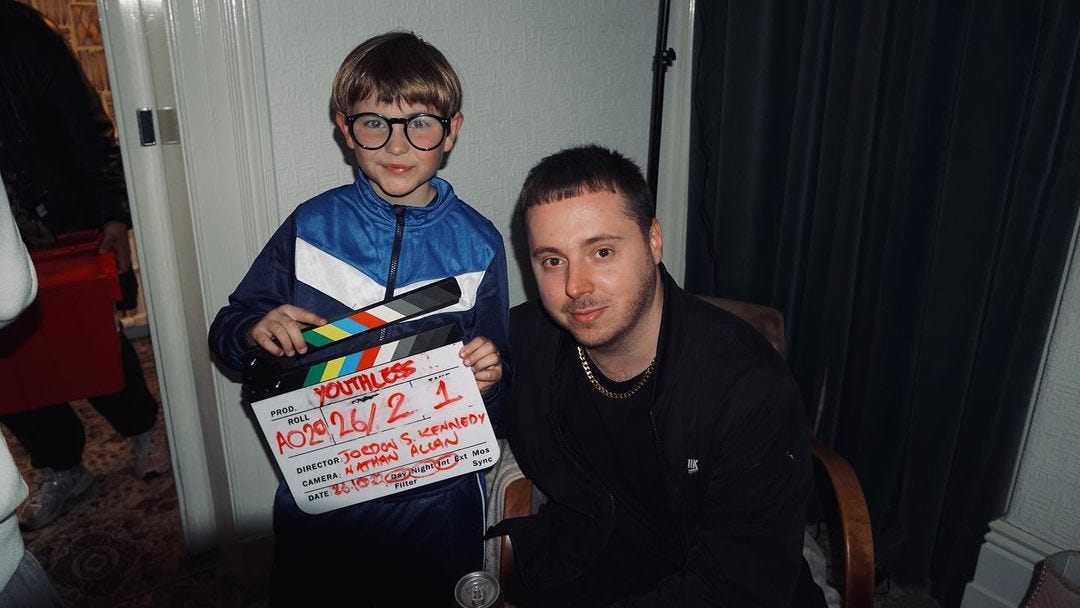Broadcasting: Jordon Scott Kennedy
Working-class writer and director Jordon Scott Kennedy shares his perspective on the representation of working class communities on our screens, as well as his own experiences within the industry.
Jordon was born and raised on Dewsbury Moor Estate. As a writer and director, his stories are strongly influenced by his upbringing in a town that is largely disconnected from the rest of the UK and regularly misrepresented on our television screens. In 2023, Jordon’s first microbudget feature-length film Suicide Kelly won Best Picture and Best Director at the BAFTA accredited film festival British Urban. Jordon is currently working on his next film Dynamite Dealer which shoots late spring.
I first met Jordon shortly after the announcement that his semi-autobiographical short film Youthless was optioned as a six-part TV series by Rollem Productions. Honestly, they’re so lucky to have him. Not only is he a brilliant filmmaker, but he’s also the Creative Lead at The Unit Bradford where he supports Channel 4, Screen Yorkshire and Bradford Council to further develop the screen sector in the Bradford district. In August 2023, his inclusive production company Idle Work Factory opened its own SIGN-backed free film school to ensure filmmaking remains accessible to everyone in the North of England. It’s so inspiring to speak to someone as passionate about his craft as Jordon is, and I loved sitting down with him for this.
I think it’s all about finding the very person that you’re trying to represent and putting them in the position of power. Let them tell the executives how to do it, not the other way around.

As a writer and director, your projects tend to focus on communities in West Yorkshire. Why is telling stories about the region so important to you?
Growing up, there weren’t that many films or TV shows that made me feel represented. Back then the only way to access films was by swapping videos. I’d knock on my neighbour’s door to ask if they wanted to do a swap and they’d tell me to do one because they thought I was trying to give them Disney stuff. Then they’d see a copy of Reservoir Dogs or something in my hand and be like, ‘alright fine - we’ll swap!’ I watched so much, but I never really felt like I saw myself on screen. I remember relating to Ken Loach’s Kes, and then - when I was a bit older - Lip Gallagher in the first season of Shameless. I feel like, at the time, he was one of the only portrayals of a lad from a similar background to me who was aspirational and intelligent.
I started writing as a bit of an outlet. I remember trying to copy people I admired at first, like Tarantino and Scorsese, but then I found my own voice. It felt and continues to feel natural to me to set these stories within the communities I grew up in. It’s never really been about trying to get an audience or industry validation; I want to create films about my community that can help them feel seen in a way I didn’t. I want to rep where I come from but also include people in that process who feel otherwise marginalised by it. It’s only in the last couple of years that the industry has decided that these stories and communities are worth representing.
How do you feel about that industry shift? I imagine part of you is happy, obviously, but is there something a bit insidious about the sudden desire to represent a certain community or experience?
I’m glad you’ve asked that because it’s something I talk about a lot. There have been times where I’ve been on a panel with industry leaders and I’ve looked around and been like, ‘why am I here?’ There is definitely a level of tokenism, but then I think why not take that and turn it into something positive? It’d be spiteful for me to say I’m not doing it, because at least I’m on the panel at all, right? I believe creativity is a poor man’s currency. And role modelling is so important in the arts. I used to LOVE Oasis (for context, there’s an Oasis record behind Jordon and he’s holding an Oasis mug), and a lot of that was about seeing Liam Gallagher owning where he came from. You have to wear that badge with pride. I never try to enunciate or speak in a certain way. I think it’s really important that people can hear in my voice where I’m from.
You are a role model to the younger generation on a daily basis, through your role as a Creative Lead at The Unit Bradford and a tutor at Met Film School. What do you hope to instil in this next generation of filmmakers?
It’s funny to hear you call me a teacher because for such a long time I was averse to the idea of it. I didn’t have a great time at film school, so I never thought I’d want to teach. When I was doing my low budget films, I started getting people on set who really wanted to be filmmakers but didn’t have the GCSEs or training. There’s one lad I had on set when he was 15; he now works for me full time and has just had his film screened at BFI Future Film Festival. I thought I’ve got to keep doing that - bringing on young talent and training them up. So I guess I sort of fell into teaching without really realising that’s what I was doing! But I love it. I want to show the younger generation that it’s possible, that their future isn’t predetermined. Some people buy lottery tickets; for me, it was always ‘one day, I can make a film’. An industry now exists in West Yorkshire, but they source people from down South to run it. What we really need is talent from the surrounding communities to be influencing the content that’s being made.

It sounds like you dedicate a lot of your time to helping talent from working class backgrounds get into the industry. I’m interested to know if you find other filmmakers to be as generous with their time as you are with yours?
Most people are! I couldn’t have got to where I am without the help of others. The focus at film school was always on how competitive the industry is, but I think it’s about helping your peers, not tearing them down. You help them, they help you; you gas each other up! We all talk about the ‘industry’ as if it exists, like it’s a real thing. But you can’t exactly go somewhere and be like ‘hey, here I am, I’m in the industry!’. The industry is about connections. I signed with my agent because of someone I’d helped years and years ago. I look at what Stephen Graham and Hannah Walters are doing and I admire that so much - they’re actually creating real, tangible opportunities for people. And it really does make an impact. Jimmy McGovern was so vocally supportive of my short Youthless, which I think made a real difference it in getting optioned as a TV series by Rollem, as well as giving me so much confidence.
Not everyone’s like that though. I won’t name any names, but I reached out to a prominent filmmaker from West Yorkshire who’d asked to watch the film. I asked them for a quote and they didn’t even give me three words. They ghosted me, ha! It’s disappointing that there are people out there who will exploit and capitalise on working class stories, but actively not help when given the chance. I never want to be that person that shot someone down. I always try and do as much for people as I can.
You mentioned having a bad time at film school. Can you talk more about that?
Before I went to film school, I’d never really met anyone who wasn’t working class, so I didn’t really have the context of what it meant. But then I left the estate to go there and I was met with such snobbery. People immediately made an assumption about me and my capabilities. My accent was mocked back to me. People would say things like ‘when you start talking I’m always surprised that you actually have anything insightful to say!’. It wasn’t just students either - it was tutors too. And it was at a time when the demonisation of working class people was rife. Shows like The Jeremy Kyle Show, Can’t Pay? We'll Take It Away! and Benefits Street vilified us, showing us as lazy. That really riles me up. It’s why I called my production company Idle Work Factory, playing on that ignorant and offensive notion that we’re all just products of our laziness.
My third year got pretty bad. I felt really isolated. No-one wanted me in their group and I went from getting a straight first to non-submissions. I wanted to finish but I had no-one to collaborate with, so it was impossible. I’d just been commissioned to make a biopic about Charlie Chaplin, so I asked if I could come back next year and submit my final project then. They said yes, but four days later I got a letter from Student Finance saying I was no longer a student and that I needed to pay them back. When I spoke to my tutors, I was told, ‘you’re no longer our problem’. So I had to open a legal case against the entire school. And about a year later, I won! A lot of people got exposed and people lost their jobs. It was a horrible time of my life, but I hope that I can learn from it and give my students the experience I should have had.
How do you think we can enact real change in our industry in terms of representation?
I think it’s all about finding the very person that you’re trying to represent and putting them in the position of power. Let them tell the executives how to do it, not the other way around. I’ve been on panels before where everyone’s scratching their head wondering why they’re not able to reach a certain community and I’ve thought, it’s because none of you lot are willing to give up your seat! It takes someone from within the goldfish bowl to truly understand what it’s like. You know when you’re a kid and someone comes into school to give a talk on not doing drugs and you’re thinking, you’ve never seen a drug in your life! When I go into youth centres and schools I’m always totally honest with them about what I got up to as a kid. It was also a motivator for why I made Youthless from the POV of a 13 year old. I never want to patronise.
I also think there’s a real lack of films and TV shows about working class communities that are made with energy anymore. The last thing I can think of is probably This Is England - that has such attitude and warmth. British social realism really needs freshening up. When you go and watch a Ken Loach film, most of the audience members are white, middle-class, and over the age of 50. When I ask members of my family what they’re watching, most of them will say something like Brassic. That’s an example of a show that feels like it’s not only about working class communities, but for us too. It captures the humour, the spirit, the optimism and the resilience, in a way that so few other shows do. People forget that the average working class person doesn’t wake up and think, ‘I’m working class and life is shit’.
What advice would you give to aspiring filmmakers?
Two things:
Firstly, don’t underestimate the good social media can do, but don’t ignore the bad, either. I’m going to name drop now, but last week I spoke to Francis Ford Coppola! I messaged him to tell him that the whole reason I go by Jordon Scott Kennedy is because I remember him saying how you should make your name massive on screen and people will remember you. Social media can be amazing for connecting people and getting through the gatekeeping aspect of filmmaking, but ignore anyone who tells you that what you’re doing isn’t good enough. The industry is futile, and there are always going to be ugly conversations and perspectives. Filter out anything that dissuades you from pursuing your goal. Remind yourself why you started and focus on that.
Secondly, don’t fall in love with the outcome, with the perceived idea of success; fall in love with the process. The success may or may not come, but you’ve got to be in the present. The thing that got me out of bed in lockdown was writing. I’d wake up and start writing, before my brain even knew what I was doing. I do it because I like spending time with the characters I create. I’ve always said the day I go on set and feel like I’m at work is the day I need to pack it in, because let’s be honest - there are easier ways to make a living!!





LOVE this interview! :)
Great interview - thank you and thanks Jordan.